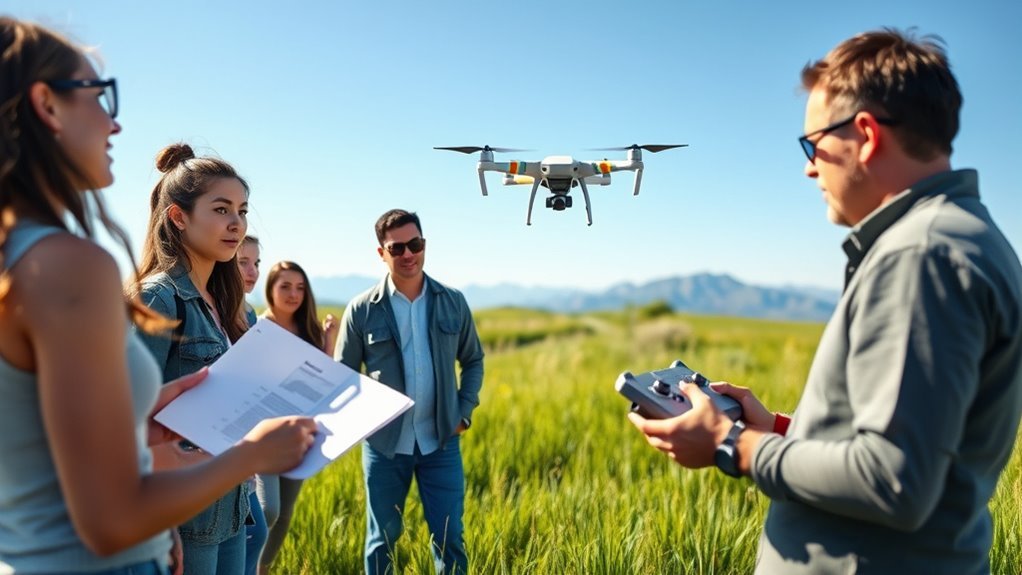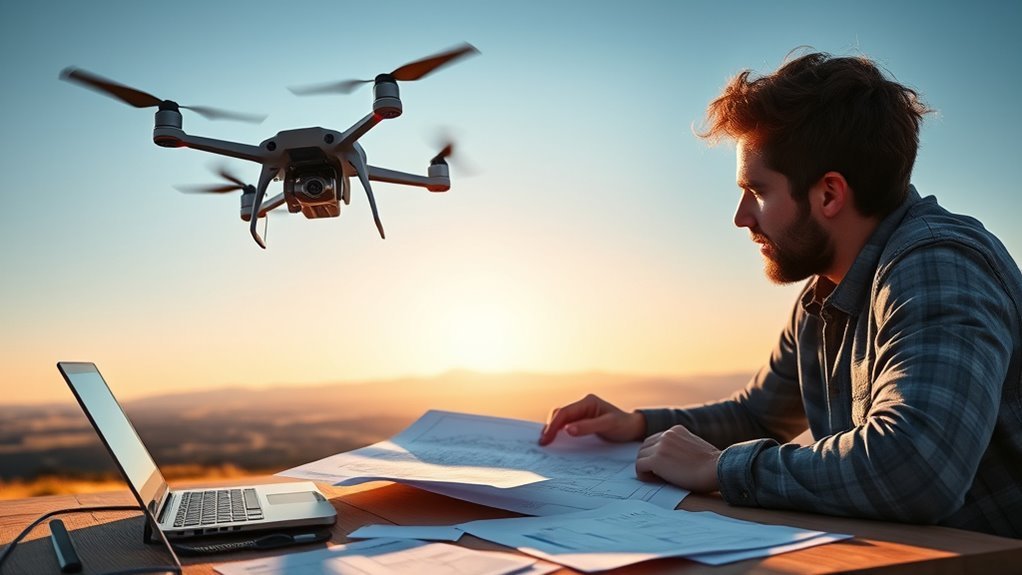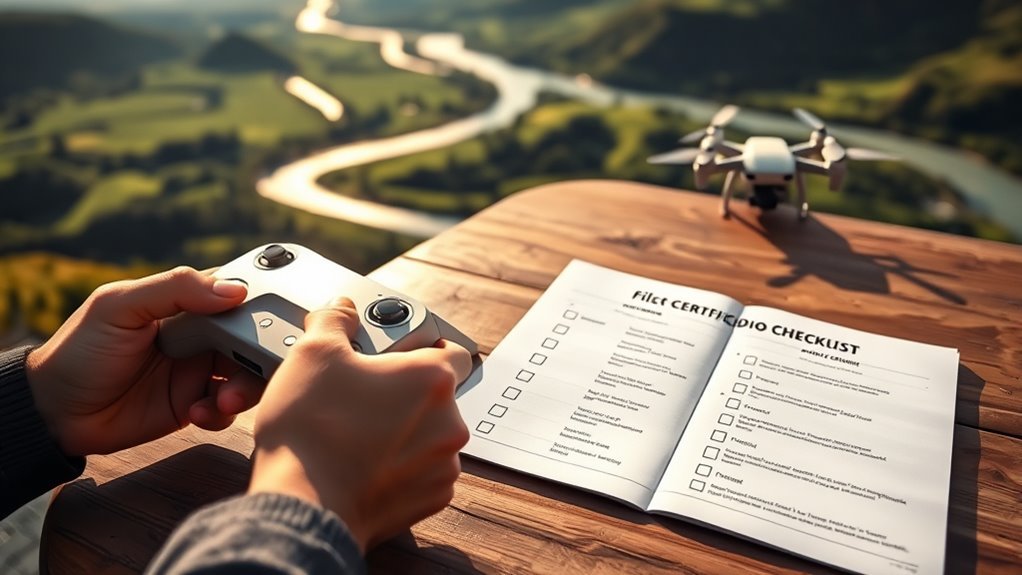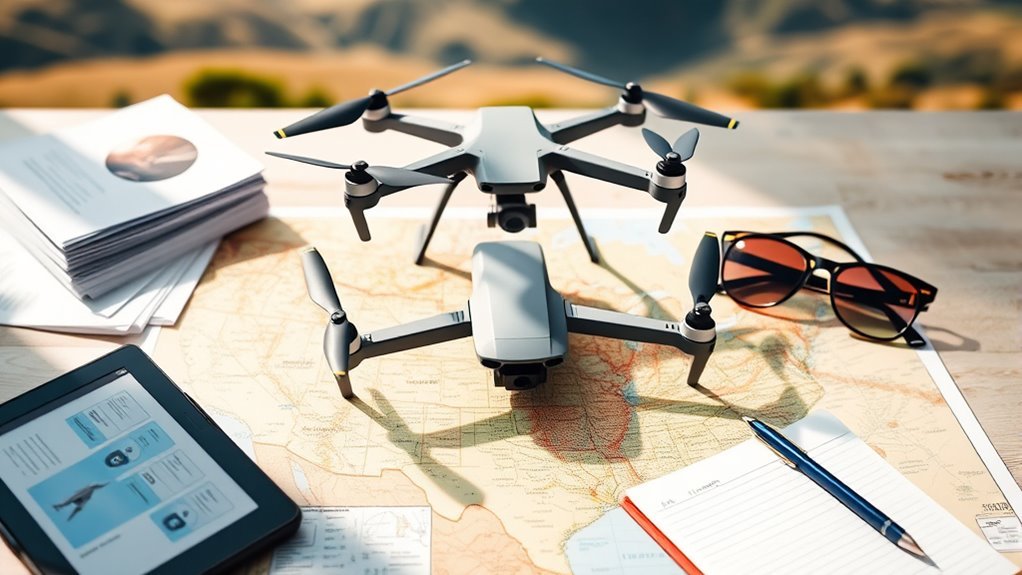To obtain a drone pilot license, you must first understand regulatory requirements like FAA compliance and choose between a commercial or recreational license. Prepare for the FAA’s Aeronautical Knowledge Test by studying airspace, weather, and safety protocols. After passing the exam, register your drone with the FAA, ensuring it’s compliant. Remember to keep your certification updated through renewal and ongoing education. There’s more to explore about maintaining your skills and knowledge in this evolving field.
Understanding the Requirements for a Drone Pilot License

When you’re looking to obtain a drone pilot license, it is vital to understand the specific requirements set forth by regulatory authorities, such as the FAA in the United States. You’ll need to demonstrate regulatory compliance by passing the FAA’s Aeronautical Knowledge Test, which covers essential topics like airspace classification, weather, and drone safety. Familiarize yourself with the operational limitations and maintenance protocols for your drone to guarantee it meets safety standards. Additionally, you may need to register your drone and maintain a record of flight hours. Understanding these requirements not only helps you navigate the licensing process but also empowers you to operate confidently and responsibly, maximizing your freedom as a drone pilot while adhering to necessary regulations.
Choosing the Right Type of License

How do you determine the right type of drone pilot license for your needs? First, you need to assess whether you plan to fly commercially or recreationally. If you’re looking to earn income, a commercial license is vital, allowing you to operate under Part 107 regulations. This type of license opens opportunities for aerial photography, surveying, and inspections, granting you the freedom to explore various professional avenues. Conversely, if you’re flying solely for enjoyment, a recreational license suffices, but be aware of its limitations. Understanding these license types is fundamental in aligning your goals with regulatory requirements. Evaluate your intentions carefully to guarantee you choose the appropriate path, maximizing both your freedom and compliance in the skies.
Preparing for the Knowledge Test

Preparing for the knowledge test is a critical step in obtaining your drone pilot license, and dedicating at least a few weeks to study can greatly enhance your chances of success. Start by gathering thorough study materials that cover the FAA Part 107 regulations, airspace classifications, and weather considerations. Utilize online resources, textbooks, and instructional videos to reinforce your understanding. Additionally, practice tests are invaluable; they help you familiarize yourself with the test format and identify areas where you need further improvement. Aim to take multiple practice tests to build confidence and make sure you’re well-prepared. By systematically studying and evaluating your knowledge, you’ll position yourself for success in this essential phase of your journey toward drone piloting freedom.
Taking the FAA Part 107 Exam
After you’ve thoroughly prepared for the knowledge test, it’s time to take the FAA Part 107 exam, a critical step toward earning your drone pilot license. To maximize your chances of success, implement effective test preparation strategies, such as utilizing practice exams and familiarizing yourself with the exam format. On exam day, arrive early to reduce stress and guarantee you have all necessary materials, including identification and any required documents. Stay calm and focused during the test; remember, time management is key. If you encounter challenging questions, don’t hesitate to mark them for review and move on. Your preparation will pay off, granting you the freedom to operate your drone commercially once you pass the exam.
Registering Your Drone
Before you can legally operate your drone for commercial purposes, registering it with the FAA is vital. The drone registration process is straightforward but essential for compliance with legal requirements. First, visit the FAA’s registration website and create an account. You’ll need to provide your name, address, email, and drone details, including its weight and model. After submitting the information, you’ll pay a nominal fee, typically valid for three years. Upon completion, you’ll receive a registration number that must be affixed to your drone. Registration is required for drones over 0.55 pounds failing to register can lead to significant fines and legal complications, undermining your freedom to fly. Additionally, ensure that your registration adheres to local and federal regulations to enjoy your aerial pursuits fully. Stay informed and make sure that your drone remains compliant to enjoy your aerial pursuits fully.
Maintaining Your Certification and Staying Informed
While it’s essential to obtain your drone pilot license, maintaining that certification is equally important to guarantee compliance and safety in your operations. To keep your license valid, you’ll need to navigate the renewal process, which typically occurs every two years. Make sure you’re aware of the specific requirements, as they can vary by jurisdiction. Ongoing education is vital; staying informed about regulatory changes, technological advancements, and best practices enhances your skills and guarantees you’re operating within legal boundaries. Consider enrolling in refresher courses or engaging with online forums to connect with fellow pilots. Additionally, understanding geofencing technology can significantly improve your operational efficiency and effectiveness. By committing to these practices, you not only uphold safety standards but also embrace the freedom that comes with being a knowledgeable, responsible drone operator.
Frequently Asked Questions
Can I Fly My Drone for Commercial Purposes Without a License?
You can’t legally fly your drone for commercial purposes without a license. Familiarize yourself with drone regulations and commercial guidelines to guarantee compliance, protecting your freedom to operate within the law and avoid penalties.
What Are the Age Requirements for Obtaining a Drone Pilot License?
To obtain a drone pilot license, you must be at least 16 years old for age verification. This requirement is essential in the licensing process, ensuring you possess the maturity necessary for safe, responsible flying.
How Long Does It Take to Receive My Drone Pilot License?
Once you’ve submitted your application, the processing time typically takes about 6 to 8 weeks. Afterward, your license validity begins, granting you the freedom to soar through the skies as a certified pilot.
Are There Any Medical Requirements to Obtain a Drone Pilot License?
Yes, there are medical requirements. You’ll need a medical examination to guarantee you meet specific vision standards. This assessment confirms your fitness to operate a drone safely, allowing you the freedom to explore aerial possibilities.
Can I Use My Drone Pilot License Internationally?
Yes, you can use your drone pilot license internationally, but you must comply with each country’s regulations. Additionally, consider obtaining drone insurance to cover potential liabilities and guarantee protection during your international flights.

